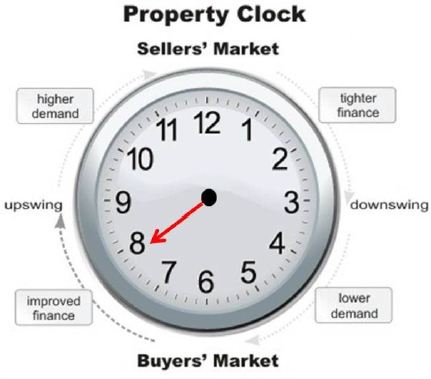
July Property Clock
Knowledge Factory’s, SA Property Transfer Guide has kept its Property Clock unchanged this month at 21 minutes to the hour. The Clock measures high-level national trends in the residential real-estate market. It retreated by five minutes in 2011 and moved forward by one minute in March 2012. Property Sector Analyst, Dieter Deppisch, comments: “The 2012 mid-year mark finds the USA on the presidential campaign trail, Mexico with a new leader, Syria at war (still), the Franco-German alliance changing Europe‟s diapers, and Mangaung looming large for the ruling party. The fall in fuel prices in June induced a smile that will widen with another drop in July.
OOBA‟s average house price was marginally down while the Kagiso Purchasing Manager‟s Index (PMI) remained stable. The PMI‟s Employment sub-index even moved up a notch. However, its leading indicator (new sales orders as a ratio of inventories) fell to its lowest level since 2009 – an indication that inventories are still higher than the demand for manufactured goods.
The property sector is running out of adjectives. The current market is being described as “subdued”, “slowing”, “pedestrian”, “restrained”, “weak” and “running out of steam”. Indeed, although pockets of strong demand are found in most major metros, any expectations for a swing to a seller’s market have been shelved for the immediate future.
Domestic real economic growth is forecast to be slightly down this year from 3, 1% in 2011, driven by global economic developments set to have a dampening effect on our export performance. May’s CPI of 5, 7% made a faster than expected return to the SARB‟s target range (3% – 6%). Hence, Nedbank expects a rate-hike around March 2013 while ABSA has pushed their expectation further forward to late 2013. In any event, unless the Eurozone‟s contagion becomes an economic “Ebola”, we are unlikely to see a rate-cut stimulus this year. The Eurozone is our largest trading partner. Flying there may take 9 hours but its impact on the Rand takes just minutes, vacillating between R10,59–R10,33/Euro in the past month alone.
Despite the surfeit of gloomy news, houses and apartments are transferred into the names of new owners each and every day. People get married, get divorced, get a promotion, are transferred, lose their job, die, have children or their children leave home. This happens almost 15,000 times each month in South Africa (excluding RDP transfers). These life-stage drivers ensure the market is never stagnant. It is excellent that more 1st time buyers are joining the fray as local banks support them with attractive or in some cases, even generous, loan-to-values (LTVs). In the wake of allegations made against a prominent auction-house, investors are returning to auctions as fears of “ghost-bidding”, dissipate.
Knowledge Factory salutes:
1) Astute estate agents who ensure their mandates are correctly priced.
2) Agents who use comparative pricing analysis and auto valuation models (AVMs) to help sellers advertise their homes at market related values and
3) Agents who use only the best property listing portals to ensure they get maximum eyeballs on their listings.
Each month thousands of potential buyers cybersurf for insight and opportunities long before contacting their local estate agent. So ask yourself: Are you really “visible”? Tough decisions require unadulterated information. Knowledge Factory is committed to supplying sophisticated data to help buyers, sellers and property professionals make informed decisions.
Dieter Deppisch
Property Sector Analyst







